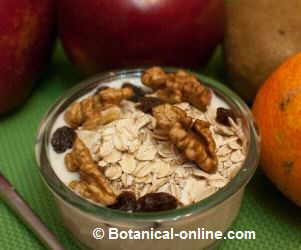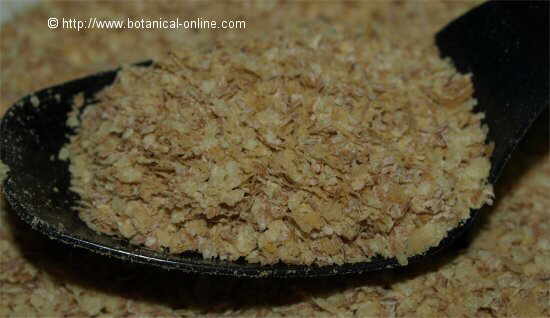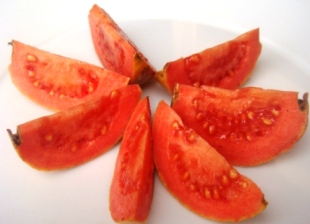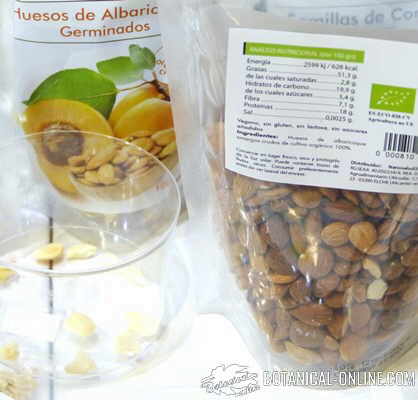Contents
- 1 When not to eat kiwis
- 1.1 What contraindications does kiwi have?
- 1.2 Allergy to kiwi and latex
- 1.3 Are people with an allergy to fruits allergic to kiwi?
- 1.4 Interactions of kiwi with medicines
- 1.5 Kiwi can damage your teeth
- 1.6 Is kiwi good for the stomach?
- 1.7 Can you eat kiwi on the FODMAPs diet or diet for irritable bowel?
- 1.8 Kiwi, contraindicated for migraine
- 1.9 Does this mean that kiwi produces migraine?
- 1.10 Kiwi for diabetes
When not to eat kiwis
What contraindications does kiwi have?
As an edible and nutritious food, kiwi does not present important contraindications and is well tolerated for most people, of all ages. It is used in numerous recipes and it is also part of many home remedies and natural treatments, for example as a remedy for constipation.
Despite its benefits, this fruit is not totally free of contraindications. It is convenient to know what possible contraindications presents the kiwi to prevent possible adverse effects of its consumption.
Allergy to kiwi and latex
Kiwis can produce allergic reactions with manifestations in the skin or mucosa. It has been observed that people with allergies to latex can develop allergies to fruits such as kiwi (banana, avocado, chestnut, papaya, pineapple, fig, melon, mango, peaches , tomatoes, etc.) due to cross-reactivity. 20-60% of people with latex allergy develop allergies to fruits.
On the other hand, a person allergic to these types of fruits should be tested for latex allergy because there is a risk of anaphylaxis (class I chitinases are cross-reactive with latex hevein). It is important to know these cases, known as latex fruit- syndrome to avoid possible complications (Go to the allergist doctor).
Are people with an allergy to fruits allergic to kiwi?
People with “allergies to fruits” are probably allergic to kiwifruit and should avoid it, both food and all those utensils that have touched the kiwi.
Contact with the fruit or with bags or objects that have been in contact with it can produce severe allergic reactions.
This type of allergy is known as allergy to LTP (lipid transport proteins). It is an allergy to proteins that have certain fruits, such as kiwi (Actinidia deliciosa), peach (Prunus persica), apricot (Prunus americana), apples (Malus domestica) or plums (Prunus domestica).
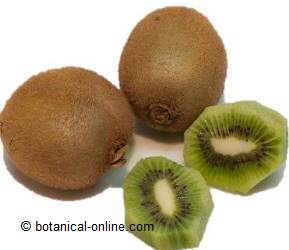 Image of kiwis
Image of kiwisInteractions of kiwi with medicines
As an edible food, kiwi is eaten without major contraindications or dangers by medication. Even some experts, due to the high vitamin C content of the kiwi, recommend taking it along with iron, to increase its absorption.
One of the most worrying aspects of kiwi is its high content of vitamin K (kiwi is the fruit richest in this vitamin), a component that could interact with anticoagulant drugs, such as Sintrom, Coumadin or warfarin. Regarding this issue, experts recommend caution, ie: consume fruit in moderation if you are taking anticoagulants and not combine it with other foods rich in vitamin K, but it should not be a prohibited food (More information).
Kiwi can damage your teeth
The kiwi, due to its content in acids, can produce irritation and damage the tooth enamel, which can acquire a yellowish color. This is mainly due to the fact that the citric acid contained in the kiwi is a little corrosive.
In a normal diet, this is not a problem for the teeth, but it could cause discomfort if you drink a lot of squeezed kiwi, for example taking the popular green juices or green juices loaded with kiwi, several times a day.
Is kiwi good for the stomach?
In the diet for the ulcer or diet for gastritis, it is often recommended to avoid acidic fruits, such as kiwi, tomatoes, … This is because the acids in fruits lower the pH of the stomach and increase gastric acidity. This property is beneficial because it facilitates digestion, but in sensitive stomachs, these acids produce more pain by increasing acidity, that is, the opposite effect of stomach protective medications. Therefore, in case of gastritis, stomach ulcer, Helicobacter infection or acidity, it is best to avoid very acid foods such as kiwi.
Can you eat kiwi on the FODMAPs diet or diet for irritable bowel?
The kiwi can be eaten in case of following a diet low in FODMAPs, which is a type of diet used in diet therapy to treat bowel syndrome or irritable bowel syndrome.
Kiwi, contraindicated for migraine
For a long time, migraine was considered a disorder of unknown origin and with little success of treatment. However, in recent years, scientific studies have shown that migraine is associated with more than 80% of cases of DAO deficit. It is a food theory that treats migraine quite successfully, and whose application is already found in many hospitals.
In this case, it has been proven that the ingestion of certain foods, such as kiwi and citrus fruits (orange, orange juice, lemon, …) aggravates the migraine due to the accumulation of histamine.
Does this mean that kiwi produces migraine?
What is stated in the previous point does not mean that the kiwi produces migraine to all people.
It only produces migraine (or aggravates it) in those people who have diagnosed a deficit of the DAO enzyme, for whom the kiwi would be a prohibited or reduced food.
Kiwi for diabetes
There is the myth that the kiwi is bad for people with diabetes because it contains “a lot of sugar”. It is a misconception, because this fruit, in general, is a good food for diabetes and you should only try to consume it in adequate rations, without sweetening (do not add sugar, honey or similar) and, of course, that the global diet global is appropriate for diabetes.
![]() More information on kiwi.
More information on kiwi.


